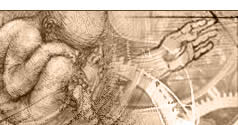 |
 |
 |
 |
 |
 |
 |
 |
|
 |
 |
 |
73 Teleology and orderliness
|
| Menu | back |
According to many scientists, the infinite number of cosmic and biological structures that we can observe today allegedly developed by pure chance. This dogma contradicts the goal-directedness (teleology) and orderliness that are recognizable in all of nature. If nature actually had developed by chance processes only, teleology should not be recognizable.
Most evolution advocates attempt to explain the origin of life using matter and natural laws alone. According to this concept, teleology should not exist in nature. In this context, political scientist and biologist Robert Wesson recognized, The only question where modern authors have a unanimous opinion is that adaptation (through mutation/selection) is not teleological (1).
This unanimity can be explained from the common, materialistic approach of scientists. But how can the evolutionist Aldous Huxley describe evolution as a determined chronologically irreversible process (2) when at the same time purposefulness is specifically refuted.
Nobel Prize winner Jacques Monod had to admit that the cornerstone of the scientific method is the postulate of the objectivity of nature
This postulate of objectivity is essential for science
Particularly objectivity obliges us to recognize the teleonomic character of life, to admit that it follows a plan in its structure and performances. The central problem of biology is this contradiction itself (3).
This contradiction cannot be avoided with a materialistic ideology. The postulate of complete purposelessness can hardly be sustained by consistent thought on the concrete reality of nature (4).
Vestiges of God in creation (5)
In his book Spuren Gottes in der Schöpfung, Reinhard Junker presents a profound description and detailed analysis of the criticism of the principle ideas of the intelligent design movement. He approaches the subject of teleology in biology from the perspectives of scientific theory, science and theology, whereby the incapability of previous evolutional models to explain this phenomenon is elaborated concisely.
These 74 | Menu |
back
|
References:
|
| (1) |
Robert Wesson, Beyond Natural Selection, Cambridge/Mass. 1991, German Edition: Die unberechenbare Ordnung, Artemis & Winkler, München, 1993, page 31. |
| (2) |
Johannes Grün, Die Schöpfung, ein göttlicher Plan, page 509. |
| (3) |
Jacques Monod, Le Hasard et la Nécessité, Paris, 1970, page 37f. (German edition: Zufall und Notwendigkeit, München, 1971). |
| (4) |
Phillip E. Johnson, Darwin im Kreuzverhör, CLV Bielefeld, 2003, page 145. |
| (5) |
Reinhard Junker, Spuren Gottes in der Schöpfung? Eine kritische Analyse von Design-Argumenten in der Biologie, Holzgerlingen, 2009. | |
| |
Comment this Site!
|
 |
 |
 |
 |
|

